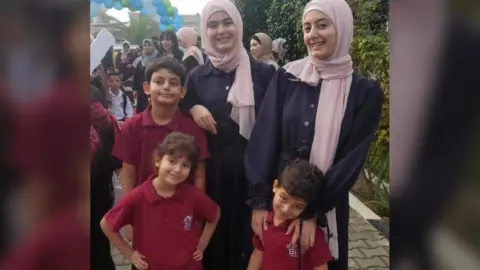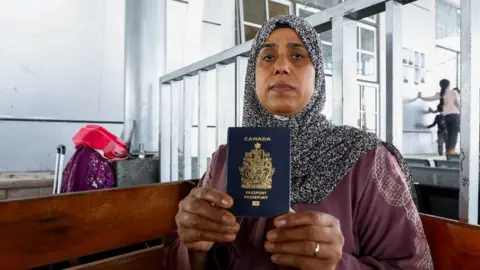Canadian man chooses to stay in Gaza to document the war
 Mansour Shouman
Mansour ShoumanA Palestinian-Canadian father has decided to stay behind in Gaza, despite finally being allowed to leave the embattled enclave.
Mansour Shouman told the BBC that he feels a responsibility to remain and document the events around him.
He said his five children and wife are among the first Canadians who managed to cross safely into Egypt on Tuesday.
Of the 80 Canadians approved to leave Gaza so far, about 75 have gotten out safely.
Global Affairs Canada has said that they are aware of more than 400 Canadian citizens, permanent residents and their family members who want to leave through the Rafah crossing into Egypt.
Mr Shouman, a management consultant, said that for him staying behind is an obligation.
"As long as 2.3 million people are suffering, I believe that it is my religious obligation, my humanitarian obligation to stay and tell the story about what is really happening," he said.
"I can speak English, I've lived in the West," said Mr Shouman, who has already spoken to several international news outlets, including the BBC
Mr Shouman is an alum of Queen's University in Kingston, Ontario and the University of Calgary in Alberta, and has worked for several years in Alberta's oil and gas sector.
Originally from Jerusalem, Mr Shouman said that he and his family chose to move to the occupied Palestinian territories two years ago so that his children could grow up in their ancestral homeland.
They chose to live in Gaza, he said, as it is his wife's hometown.
"We had been living a very nice life here," Mr Shouman said, despite the long-standing turmoil in the Gaza strip.
"Our kids were going to international school," he said. "My wife and I were working. We had a lot of friends. The local mosque was great."
But he added he and his family never expected to be in the middle of the current war.
Now, Mr Shouman has made a hospital in Khan Younis his home, where he sleeps in a small room next to the maternity ward.
"Whenever a new baby is born, I hear the good news," he said.
The Rafah border crossing between Gaza and Egypt opened on Wednesday to allow a number of civilians to leave. Hundreds of foreign passport holders, including more than 400 Americans, have crossed so far. It was their first opportunity to do so since the war began on 7 October.
The lists of those allowed to cross is agreed upon by Egypt and Israel. Then, the relevant countries are notified to ensure they are ready to receive their citizens.
Canada's foreign ministry has said the "situation is quite fluid and unpredictable" and that people should be prepared "for significant delays".
Just before 01:00 local time on Tuesday, Mr Shouman said his family received an email from Canada's foreign affairs ministry, telling them that they were on the list of those approved to evacuate out of Gaza.
They were told to head to the border at 09:00, where they would be met by Canadian consular staff on the Egyptian side. There, they would stay for 72 hours to rest before traveling back to Canada.
Mr Shouman said that as a husband and father, he had an urge to remain with his family. But "the decision to stay behind was easy," he added.
He said it is important for him to help in any way, "even if I am just removing rubble from the ground, even if I am just covering the news".

More on Israel-Gaza war
- Follow live: Latest updates
- Analysis: Jeremy Bowen's five new realities after four weeks of war
- From Gaza: Stories of those killed in Gaza
- Watch: Breaking down videos from Gaza's secret tunnels
- Explained: Ros Atkins on... Calls for a ceasefire in Gaza
- History behind the story: The Israel-Palestinian conflict

Hundreds of Canadians remain in Gaza
Mr Shouman's family are among the first Canadians who have managed to leave, but hundreds of others are still stuck among bombed-out buildings, with dwindling supplies.
The 73-year-old father of Samah Al-Sabbagh went to Gaza at the end of September to visit his family.
She is frustrated that his name is not on the list of people able to leave.
"Every time I talk to my dad, I feel the despair in his voice," she said. "He says to me 'every extra day we spend in Gaza is leading us to death.'"
Over the last month the Israeli military has launched a massive bombing campaign on Gaza, placed the strip under a "complete siege" and recently launched a ground assault on the north of Gaza.
Ms Al-Sabbagh told the BBC that her father has witnessed the ongoing bombardment up close and has had to relocate four times for his safety.
Some members of their family have also been killed, she said.
The Hamas-run health ministry in Gaza says more than 10,300 people have been killed, including more than 4,000 children.
 Reuters
ReutersMs Al-Sabbagh wants Canadian officials to do whatever they can, including calling for a pause in fighting, so their citizens can safely evacuate.
"There is not a single safe place in Gaza," she said.
In a statement on social media confirming the first group of Canadians had been evacuated, Canadian Foreign Affairs Minister Melanie Joly said her department is still working on getting the rest out.
"You can rest assured that this is our number one priority," she said.
